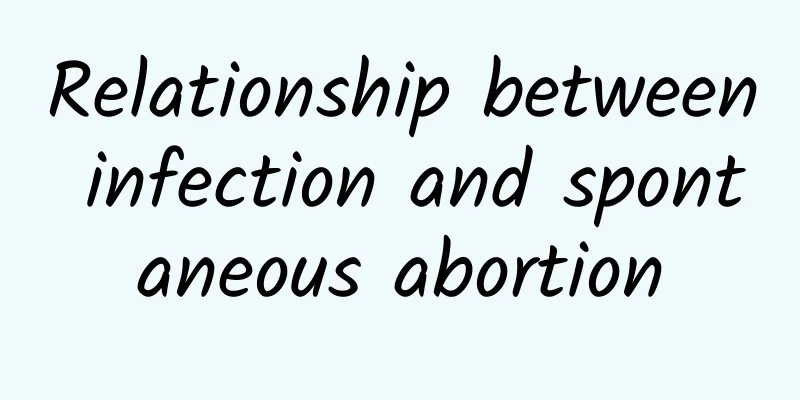Relationship between infection and spontaneous abortion

|
In our lives, many pregnant women will experience spontaneous abortion during pregnancy. There are many reasons for spontaneous abortion. Perhaps you don’t particularly understand the impact of infection on spontaneous abortion. Next, the editor will give you a detailed introduction to the relationship between infection and spontaneous abortion. Pregnant women are generally susceptible to a variety of pathogens. In recent years, the infection of female reproductive tract CT and UU has been increasing year by year, so the pathogenicity of CT and UU has also attracted much attention. However, there is no consensus among scholars on whether there is a correlation between CT and UU and miscarriage. Some scholars have conducted microbiological tests on the embryonic tissues of spontaneous abortion and artificial abortion, and believe that chlamydia or mycoplasma infection is related to the occurrence of spontaneous abortion; some studies believe that from the statistical analysis of the results, the incidence of adverse pregnancy in women with chlamydia or mycoplasma infection is not higher than that of uninfected women, so they have no trend relationship with the occurrence of spontaneous abortion. By comparing the infection of CT and UU in women with spontaneous abortion and healthy pregnant women, we found that the infection rate of CT and UU in women with spontaneous abortion was significantly increased, and the difference between the two groups was significant, suggesting that CT and UU infection have a certain relationship with the occurrence of spontaneous abortion. Although the mechanism of chlamydia and mycoplasma inducing inflammation and destroying tissues is not very clear at present. However, studies have shown that after chlamydia and mycoplasma infect the reproductive tract, the endometrium undergoes a chronic inflammatory response due to infiltration of lymphocytes and macrophages. The activity of the immune system and the production of anti-pathogen cytokines can damage the growing embryo or interfere with embryo implantation. It may also interfere with the regulatory mechanism of the maternal immune system to protect the embryo and cause miscarriage. Try to eat well, sleep well, and pay attention to increasing nutrition to enhance the body's resistance to disease and promote the early repair of damaged organs. After abortion, you should eat more protein-rich foods such as fish, meat, eggs, and bean products, as well as fresh vegetables rich in vitamins to speed up your body's recovery. You should take food supplements immediately; you should not eat raw, cold, or irritating foods. If you have the conditions, you can refer to the normal postpartum diet. In addition, you should follow the taboos after childbirth in your life, do not take a bath, do not drink cold drinks, keep your clothes warm, and avoid catching a cold. |
<<: Study on the relationship between infection and spontaneous abortion
>>: Study on Traditional Chinese Medicine for Bleeding after Medical Abortion
Recommend
What should I eat after uterine fibroid surgery? How long after uterine fibroid surgery can I have sex?
What should I eat after uterine fibroid surgery? ...
Specific clinical causes of cervical erosion
The cause of cervical erosion is very important. ...
How to prevent irregular menstruation in women? Dietary adjustment methods for women to prevent irregular menstruation
Women will feel uncomfortable for a few days ever...
Can ovarian cysts cause infertility? Is there any good way to prevent it?
Can ovarian cysts cause infertility? What are som...
13 weight loss tips to keep you from gaining weight in autumn and winter
1. A glass of water in the morning When you wake ...
What to do if there is uterine fluid during pregnancy
What should I do if there is uterine fluid accumu...
Can you eat garlic during menstruation?
You can eat some garlic during menstruation. Eati...
Causes of amenorrhea
Amenorrhea is usually caused by physiological phe...
4 abnormal conditions for early or late menstruation! TCM doctor Cai Guangqian reveals: 6 common causes of menstrual disorders
Due to high work pressure, staying up late, overw...
Women should take timely measures to prevent ectopic pregnancy
Ectopic pregnancy is very harmful to women. It is...
Three dangers of ectopic pregnancy that should be watched out for
Among many common gynecological diseases, ectopic...
What is malignant uterine fibroids? What are the symptoms of malignant uterine fibroids?
What is considered a malignant uterine fibroid? W...
What happens if there is too much pelvic fluid?
Pelvic effusion is a very common gynecological di...
Nursing tips for acute pelvic inflammatory disease
Acute pelvic inflammatory disease has a rapid ons...
Can't resist the temptation of sweets? Nutritionists teach you 8 ways to reduce sugar intake
Everyone knows that fat comes from the mouth, but...









